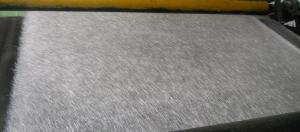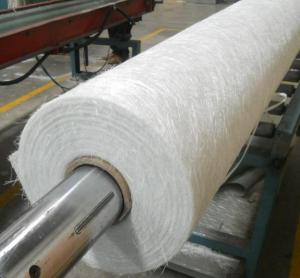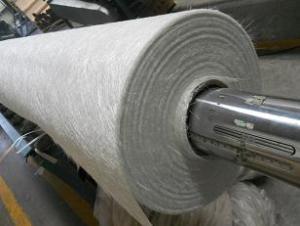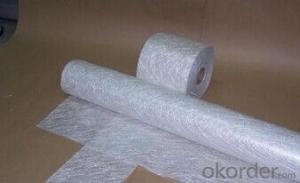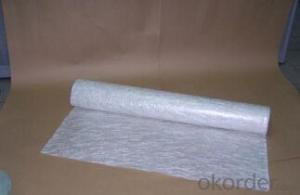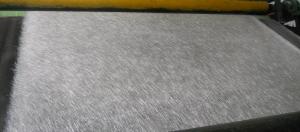E-glass Chopped Strand Mat-Emuision, 1250mm
- Loading Port:
- Shanghai
- Payment Terms:
- TT or LC
- Min Order Qty:
- 20000 kg
- Supply Capability:
- 500000 kg/month
OKorder Service Pledge
OKorder Financial Service
You Might Also Like
1.Introductions
Glass Fiber Powder Binder Chopped Strand Mat is an unwoven fabrics consisting of randomly distributed chopped strands held together with powder binder.Powder Chopped Strand Mats are compatible with unsaturated polyester, vinyl ester, phenol and epoxy resins.
2.Main Features of E-glass Chopped Strand Mat
Strong bond fibers,providing high dimensional stability ans easy handing .
Good moldability,fast and complete resin wet-out ,enabling high productively .
Good transporsision and hign strength of the composite products.
Even thickness ,no fuzz ,no stain.
Fast wet-out ,products with high strength ,little loss for strength in damp situation.
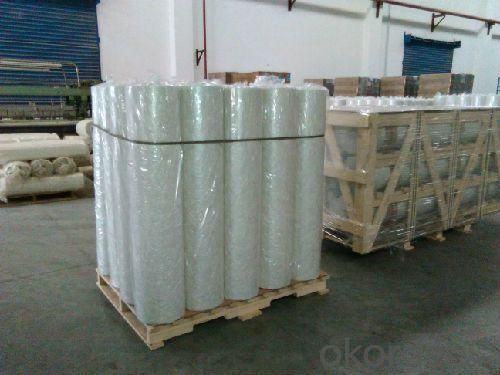
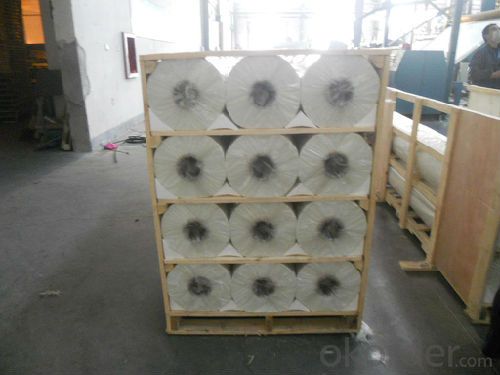
3.Technical Specification
Property | Glass type | Weight(g/m2) | Width 200~3300 | Roll Weight | Moisture Content /% | Combustible Content /% | Breakage Strength /N |
Test Method | GB/T 1549 | ISO3374:2000 | ISO3374 | GB/T17470-1998 | ISO3344:1997 | ISO1887:1995 | ISO3342 |
EMC 80 | E-GLASS | 80±16 | ±5 | 6~50 | <0.2 | 13.6±0.35 | ≥200 |
EMC 100 | E-GLASS | 100±10 | ±5 | 6~65 | <0.2 | 9.5±0.35 | ≥170 |
EMC 150 | E-GLASS | 150±15 | ±5 | 6~97 | <0.2 | 8.0±0.35 | ≥40 |
EMC 225 | E-GLASS | 225±22 | ±5 | 6~150 | <0.2 | 5.0±0.6 | ≥60 |
EMC 300 | E-GLASS | 300±30 | ±5 | 6~180 | <0.2 | 4.0±0.6 | ≥90 |
EMC 450 | E-GLASS | 450±45 | ±5 | 6~180 | <0.2 | 3.8±0.6 | ≥120 |
EMC 600 | E-GLASS | 600±60 | ±5 | 6~240 | <0.2 | 3.6±0.6 | ≥150 |
EMC 900 | E-GLASS | 900±90 | ±5 | 6~190 | <0.2 | 3.4±0.6 | ≥180 |
4.FAQ
(1)Why Choose us?
CNBM is a stated own company, provide the guarantee for the best quality, best service and safety business.
(2)How will we guarantee the quality?
a, ISO 9001-2008 quality control system;
b, Strict and regular quality control in production;
c, Inspeciation when loading into container before shippment;
d, Sample stock for one year for quality tracing and record.
(3) What is your MOQ?
Our MOQ is one pallet.
(4)Can you provide sample?
Yes, samples are in stock. we can offer free sample for you.
(5)Payment terms?
We can accept L/C, T/T etc.
- Q:Can fiberglass mat tissue be used for making insulation blankets?
- Yes, fiberglass mat tissue can be used for making insulation blankets. Fiberglass mat tissue is a lightweight and flexible material that is commonly used in insulation applications. It offers excellent thermal insulation properties, as well as resistance to fire, moisture, and chemicals. Additionally, fiberglass mat tissue is easy to handle and install, making it an ideal choice for creating insulation blankets that can be used in various industries, such as construction, automotive, and aerospace.
- Q:What are the different thickness tolerances for fiberglass mat tissue?
- The different thickness tolerances for fiberglass mat tissue can vary depending on the specific manufacturer and product specifications. However, in general, fiberglass mat tissue is available in various thickness tolerances ranging from 0.5 millimeters (mm) to 3 mm. The tolerance refers to the acceptable range of thickness variation within a certain product. For example, a fiberglass mat tissue with a thickness tolerance of +/- 0.5 mm means that the actual thickness of the tissue can vary by up to 0.5 mm in either direction from the specified thickness. The specific tolerance required for a particular application depends on the intended use and the level of precision needed. Thicker fiberglass mat tissues with smaller tolerances are often used in applications that require higher strength and durability, such as in the construction industry for reinforcing concrete or in the manufacturing of composite materials. On the other hand, thinner fiberglass mat tissues with larger tolerances may be used in applications where flexibility and conformability are more important, such as in the automotive industry for insulation or soundproofing purposes. It is important to consult the manufacturer's specifications or contact a supplier for accurate information on the available thickness tolerances for fiberglass mat tissue, as they can vary significantly depending on the specific product and supplier.
- Q:Can fiberglass mat tissue be used for wall insulation?
- No, fiberglass mat tissue is not typically used for wall insulation. It is more commonly used in applications such as reinforcing and adding strength to composite materials like fiberglass panels or laminates. For wall insulation, other materials like fiberglass batts, mineral wool, or foam boards are typically used.
- Q:Is fiberglass mat tissue suitable for railway infrastructure?
- Yes, fiberglass mat tissue is suitable for railway infrastructure. Fiberglass mat tissue is a strong and durable material that offers excellent resistance to corrosion, weathering, and chemical degradation. It is commonly used in the construction industry for reinforcing structures such as bridges, tunnels, and platforms. In the case of railway infrastructure, fiberglass mat tissue can provide several benefits. Firstly, it has high tensile strength, which means it can withstand the heavy loads and vibrations associated with train traffic. This helps to prevent cracking and structural damage, ensuring the longevity and safety of the railway system. Additionally, fiberglass mat tissue is non-conductive, which is a crucial characteristic for railway infrastructure. It helps to prevent the risk of electrical shocks and short circuits, which are common concerns in rail networks. This makes fiberglass mat tissue a reliable choice for railway infrastructure, especially in areas where electrical lines are present. Furthermore, fiberglass mat tissue is lightweight and easy to handle, making it convenient for installation in railway projects. It is also resistant to fire, making it a safe choice for railway infrastructure in terms of fire protection. Overall, fiberglass mat tissue is a suitable material for railway infrastructure due to its strength, durability, non-conductive nature, and fire resistance. Its use in railway construction can contribute to the reliability, longevity, and safety of the railway system.
- Q:Can fiberglass mat tissue be used in marine applications?
- Yes, fiberglass mat tissue can be used in marine applications. It is commonly used in boat building and repair due to its excellent strength, corrosion resistance, and durability in marine environments.
- Q:Is fiberglass mat tissue resistant to termites and insects?
- No, fiberglass mat tissue is not resistant to termites and insects.
- Q:Can fiberglass mat tissue be used for electrical enclosures?
- No, fiberglass mat tissue is not suitable for electrical enclosures as it does not provide sufficient insulation properties necessary for electrical safety.
- Q:Can fiberglass mat tissue be used for making insulation jackets?
- Yes, fiberglass mat tissue can be used for making insulation jackets. Fiberglass mat tissue is a lightweight material that offers excellent thermal insulation properties. It can effectively trap heat and prevent it from escaping, making it suitable for creating insulation jackets that provide warmth and insulation.
- Q:What are the properties of fiberglass mat tissue?
- Fiberglass mat tissue, also referred to as fiberglass mat or fiberglass matting, is a non-woven material made from glass fibers, possessing numerous properties that render it suitable for diverse applications. 1. With regards to strength and durability, fiberglass mat tissue is renowned for its high tensile strength, enabling it to endure substantial stress without fracturing. This quality makes it ideal for fortifying and reinforcing various materials and structures. 2. Despite its strength, fiberglass mat tissue remains relatively lightweight, facilitating easy handling and transportation. This characteristic proves particularly advantageous in industries where weight reduction plays a crucial role, such as aerospace and automotive. 3. The flexibility of fiberglass mat tissue allows it to conform to curved surfaces and intricate shapes. Consequently, it proves versatile and appropriate for applications requiring the material to be molded or shaped into specific designs. 4. Fiberglass mat tissue exhibits excellent resistance to various chemicals, including acids, alkalis, and most solvents. This attribute renders it suitable for use in corrosive environments, such as chemical processing plants or storage tanks. 5. Fiberglass mat tissue possesses commendable thermal insulation properties, effectively reducing heat transfer. Consequently, it proves valuable in applications necessitating heat insulation, such as the construction of walls, roofs, or insulation boards. 6. Inherently fire-resistant, fiberglass mat tissue does not contribute to the propagation of flames. As a result, it finds extensive use in applications where fire safety is paramount, such as the production of fire-resistant doors, panels, or insulation materials. 7. Furthermore, fiberglass mat tissue offers excellent sound insulation properties, diminishing the transmission of noise through walls or other structures. This characteristic renders it suitable for implementation in soundproofing applications, such as recording studios or automotive interior panels. Overall, the properties exhibited by fiberglass mat tissue endow it with versatility, allowing for a wide range of applications across various industries, including construction, automotive, aerospace, and marine. Its strength, flexibility, lightweight nature, chemical resistance, thermal and sound insulation properties, as well as its fire resistance, contribute to its popularity and usefulness in numerous applications.
- Q:How does the weight of fiberglass mat tissue affect its performance?
- The performance of fiberglass mat tissue is significantly affected by its weight. The weight of the tissue indicates the amount of glass fibers per unit area. Generally, a higher weight indicates a greater concentration of fibers, which results in improved strength and durability. To begin with, a heavier fiberglass mat tissue provides better tensile strength. The increased number of fibers in the tissue enables it to withstand higher levels of stress and strain without breaking or tearing. This makes it ideal for applications that require a high load-bearing capacity, such as structural components in the construction or automotive industries. Additionally, the weight of the tissue also impacts its stiffness and rigidity. A heavier mat tissue offers better dimensional stability, meaning it will maintain its shape and form even when subjected to external forces. This is crucial in applications where the material needs to retain its structural integrity, such as in boat hulls or wind turbine blades. Moreover, the weight of the fiberglass mat tissue affects its thermal and acoustic insulation properties. A higher weight is usually associated with better insulation capabilities, as the increased fiber density enhances the material's ability to trap air and reduce heat transfer or sound transmission. This makes it suitable for applications that require effective insulation, such as in buildings or industrial equipment. Finally, the weight of the fiberglass mat tissue can impact how easily it can be handled and installed. A lighter tissue may be more flexible and easier to manipulate, making it simpler to fit into complex shapes or tight spaces. Conversely, a heavier tissue might require additional support or equipment during installation. In conclusion, the weight of fiberglass mat tissue has a direct influence on its performance characteristics, including tensile strength, rigidity, insulation properties, and ease of handling. Therefore, it is crucial to consider the intended application and the desired performance requirements when selecting the appropriate weight of fiberglass mat tissue.
1. Manufacturer Overview |
|
|---|---|
| Location | |
| Year Established | |
| Annual Output Value | |
| Main Markets | |
| Company Certifications | |
2. Manufacturer Certificates |
|
|---|---|
| a) Certification Name | |
| Range | |
| Reference | |
| Validity Period | |
3. Manufacturer Capability |
|
|---|---|
| a)Trade Capacity | |
| Nearest Port | |
| Export Percentage | |
| No.of Employees in Trade Department | |
| Language Spoken: | |
| b)Factory Information | |
| Factory Size: | |
| No. of Production Lines | |
| Contract Manufacturing | |
| Product Price Range | |
Send your message to us
E-glass Chopped Strand Mat-Emuision, 1250mm
- Loading Port:
- Shanghai
- Payment Terms:
- TT or LC
- Min Order Qty:
- 20000 kg
- Supply Capability:
- 500000 kg/month
OKorder Service Pledge
OKorder Financial Service
Similar products
New products
Hot products
Related keywords
